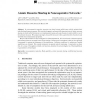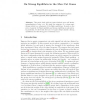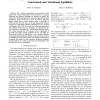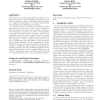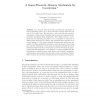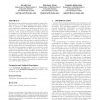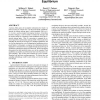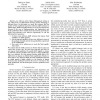INFOCOM
1997
IEEE
13 years 8 months ago
1997
IEEE
In noncooperative networks, resources are shared among selfish users, which optimize their individual performance measure. We consider the generic and practically important case o...
WINE
2009
Springer
13 years 9 months ago
2009
Springer
This paper deals with two games defined upon well known generalizations of max cut. We study the existence of a strong equilibrium which is a refinement of the Nash equilibrium. ...
CDC
2009
IEEE
13 years 9 months ago
2009
IEEE
— This paper investigates design of noncooperative games from a control theoretic perspective. Pricing mechanisms are used as a design tool to ensure that the Nash equilibrium of...
CDC
2009
IEEE
13 years 9 months ago
2009
IEEE
— We consider generalized noncooperative Nash games with “shared constraints” in which there is a common constraint that players’ strategies are required to satisfy. We add...
SIGMETRICS
2010
ACM
13 years 9 months ago
2010
ACM
Game theoretic modeling and equilibrium analysis of congestion games have provided insights in the performance of Internet congestion control, road transportation networks, etc. D...
GECCO
2003
Springer
13 years 9 months ago
2003
Springer
One problem associated with coevolutionary algorithms is that of forgetting, where one or more previously acquired traits are lost only to be needed later. We introduce a new coevo...
ECML
2003
Springer
13 years 9 months ago
2003
Springer
Abstract. Most of multi-agent reinforcement learning algorithms aim to converge to a Nash equilibrium, but a Nash equilibrium does not necessarily mean a desirable result. On the o...
ATAL
2003
Springer
13 years 9 months ago
2003
Springer
Multiagent learning literature has investigated iterated twoplayer games to develop mechanisms that allow agents to learn to converge on Nash Equilibrium strategy profiles. Such ...
AMEC
2003
Springer
13 years 9 months ago
2003
Springer
Auctions define games of incomplete information for which it is often too hard to compute the exact Bayesian-Nash equilibrium. Instead, the infinite strategy space is often popu...
INFOCOM
2003
IEEE
13 years 9 months ago
2003
IEEE
—An oblivious Active Queue Management scheme is one which does not differentiate between packets belonging to different flows. In this paper, we study the existence and the qual...
